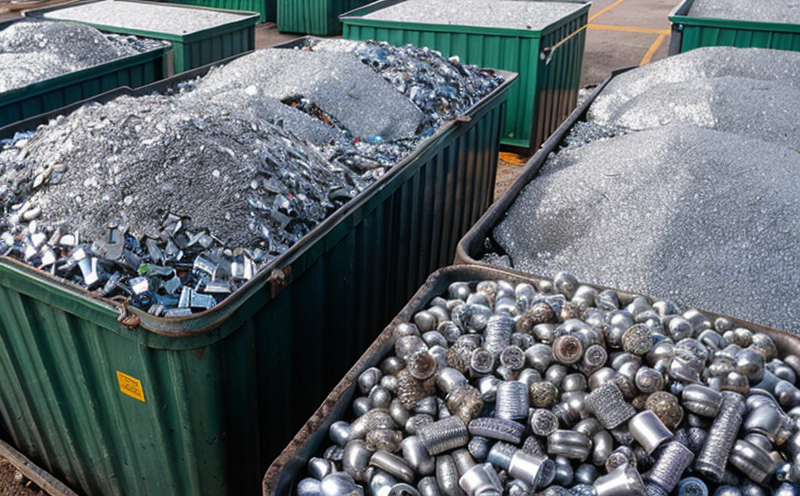ASTM E134 Niobium in Recycled Metals
The ASTM E134 standard is a critical method used to determine the niobium content in recycled metals, ensuring that these materials meet stringent quality and compliance standards. This test is essential for industries dealing with the recycling of metals such as stainless steel, titanium, and other alloyed materials where niobium plays a pivotal role in enhancing properties like strength and corrosion resistance.
The ASTM E134 method involves several key steps that are critical to obtaining accurate results. The first step is the preparation of the specimen. This typically involves grinding or cutting the sample into small, uniform pieces. It’s important to ensure that the specimen is representative of the entire batch being tested, as this affects the reliability and accuracy of the niobium content measurement.
The testing process itself uses a combination of chemical analysis techniques. Typically, inductively coupled plasma mass spectrometry (ICP-MS) or inductively coupled plasma optical emission spectroscopy (ICP-OES) are employed to measure the niobium concentration. These methods provide high sensitivity and precision, making them suitable for detecting even trace amounts of niobium in recycled metals.
The ASTM E134 test is not just about compliance with industry standards; it also plays a crucial role in ensuring that recycled materials can be effectively used in manufacturing processes without compromising quality. By accurately measuring the niobium content, manufacturers can optimize their production processes and ensure product consistency.
Furthermore, accurate niobium measurement helps to prevent contamination issues that could arise from using improperly processed or sourced recycled metals. This is particularly important for industries where material purity is critical, such as aerospace and automotive manufacturing. Ensuring the correct niobium content also contributes to meeting environmental regulations by promoting responsible recycling practices.
The ASTM E134 method ensures that recycled materials are not only fit for purpose but also contribute positively to sustainability efforts. By accurately measuring niobium, industries can make informed decisions about the quality and suitability of their recycled inputs, thereby enhancing overall product performance.
In summary, the ASTM E134 test is a cornerstone in the recycling industry, providing reliable data on niobium content that supports quality assurance, compliance, and sustainability goals. Its role extends beyond mere testing; it underpins trustworthiness and reliability in recycled metal supply chains.
Scope and Methodology
The ASTM E134 method is designed to measure the niobium content in various types of recycled metals, including stainless steel, titanium alloys, and other alloyed materials. The test scope includes both quantitative analysis and qualitative assessment, ensuring that all aspects of niobium presence are accounted for.
- Quantitative Analysis: This involves precise measurement using ICP-MS or ICP-OES to determine the exact amount of niobium present in the sample. The results are reported in parts per million (ppm).
- Qualitative Assessment: This aspect checks for the presence and form of niobium, identifying whether it is elemental or part of a compound.
The methodology emphasizes the importance of specimen preparation. Samples must be carefully prepared to ensure they are representative of the batch being tested. This includes thorough cleaning to remove any contamination that could skew results.
The ASTM E134 method also specifies the use of standard reference materials (SRMs) for calibration purposes, ensuring consistent and accurate measurements across different laboratories. The test is performed under controlled conditions to minimize variability and ensure reproducibility.
Quality control measures are integral to the ASTM E134 process. These include regular calibration checks using SRMs and proficiency testing programs. By adhering strictly to these procedures, labs can maintain high standards of accuracy and precision.
Benefits
- Enhanced Quality Assurance: Accurate niobium content measurement ensures that recycled metals meet the required quality standards, enhancing product performance.
- Compliance with Regulations: The test helps industries comply with environmental and industry-specific regulations related to material composition.
- Optimized Production Processes: By knowing the exact niobium content, manufacturers can optimize their production processes for better efficiency and cost-effectiveness.
- Promotes Sustainability: Ensuring proper niobium content in recycled materials supports sustainable practices by maximizing the use of recycled resources.
- Improved Product Consistency: Accurate testing leads to more consistent product quality, which is crucial for maintaining customer satisfaction and brand reputation.
- Supports Innovation: Reliable niobium measurement data can drive innovation in material science by enabling the development of new alloys with enhanced properties.
- Reduces Contamination Risks: By accurately measuring niobium, potential contamination issues are minimized, ensuring that only high-quality recycled materials enter manufacturing processes.
The ASTM E134 method not only supports these benefits but also fosters a culture of excellence in recycling and reusing metals. This contributes to the broader goal of reducing environmental impact while promoting economic efficiency.





